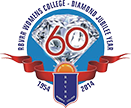Problem Solving & Critical Thinking
- Critically evaluate ideas and arguments by gathering relevant information and assessing its credibility.
- Identify problems and independently propose solutions using creative approaches, acquired through interdisciplinary experiences, and a depth and breadth of knowledge/expertise.
- Accurately interpret and use numerical information to evaluate and formulate a position.
Communication
- Accurately and effectively communicate scientific ideas, arguments and analyses, to a range of audiences, in graphic, oral and written form
Professional Growth
- Successfully perceive their career objectives in advanced education in professional or graduate schools in a scientific career in a government or industry, in a teaching career in the school systems or in a related career following graduation.
- Develop a plan for professional growth and development.
Professional and Ethical Behavior
- Demonstrate personal and professional integrity by respecting diverse points of view and the intellectual contribution of others, and demonstrating a commitment to sustainability and accessibility in scientific practice and society at large.
- Collaborate effectively as part of a team by demonstrating mutual respect, leadership, and an ability to set goals and manage tasks and time lines.
- Develop a plan for professional growth and development
- Demonstrate knowledge of the ethical, economic and social implications of scientific discovery and technological innovation
Life Long Learning
- Recognize the need for, and have the preparation and ability to engage in independent and lifelong learning in the broadest context of technological change.








